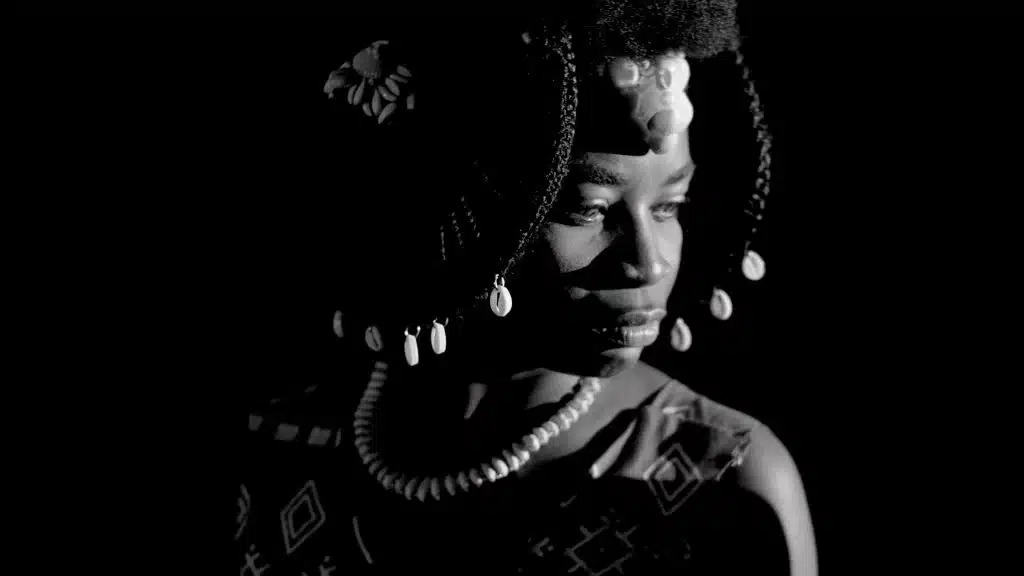
A crisis of belief besets a West African village in Mami Wata, as corruption and greed sweep in behind it. A dark, often cruel story unfolds, painting a devastating picture of the repercussions of change. The film does this without being overly simplistic, and it does it without any chiding, even if its message is firm. This is a languid, but gripping folk tale, with powerful and hypnotic performances.
The village of Iyi maintains its beliefs in traditional deities, even when other communities – and people involved in the African diaspora – have started to question them; this is made clear to us by some on-screen text at the beginning of the film, which also primes us for some crisis of confidence to follow. Mami Wata – in Pidgin, roughly, ‘Mother Water’ – functions as a protective spirit, but seemingly also makes demands on those who venerate her, demanding back what she borrows, or seeking tribute (often via a chosen Intermediary, or I suppose what some would designate a priestess: this is a matriarchal community). We get an early sense of something supernatural which is, or which could be, subtle but devastating; a young girl’s disappearance is deemed to be due to Mami Wata, here taking back a kindred spirit who always belonged to the sea. Mama Efe, as the Intermediary, is the one to speak on her behalf; her daughters, Zinwe and Prisca, seem torn between their venerated position in the village and also the draw of something else, something modernising and different.
These contested feelings only grow when a thanksgiving ceremony takes place soon after the disappearance, in which Mama Efe (Rita Edochie) receives gifts and food on the deity’s behalf. Zinwe (Uzoamaka Aniunoh) at first seems most resentful of this, despite being in line to be the next Intermediary herself. Adopted sister Prisca (Evelyne Ily) seems more straightforwardly loyal, but it’s via her that we first get the sense that Iye isn’t quite as remote as it seems at first: gradually, we encounter bars, bikes, cigarettes. This is important (the film picks up small clues and lines and it’s only later that you realise that these were heavy elements of foreshadowing). Then, when a young boy falls ill and Mama Efe cannot heal him, the younger villagers begin to openly cast doubt on her usefulness. Why are people working hard to hand over tributes, if Mami Wata no longer seems to keep them safe? A visiting doctor promises vaccines; he says no more children need to die; why not try his way?
The crisis deepens when Mama Efe and Prisca find a stricken stranger, close to drowning on the beach near their house. They help him, feed him and Prisca pities him when she hears his stories of escape from a rebel group. Jasper (Emeka Amakeze) may be traumatised by his experiences; Prisca listens, and asks him why he is so keen to get back to a world which has harmed him so much. The ambiguous pull of a modernising world outside the village bounds is a constant; the people who come from this complex, Christian(ish), materially more comfortable world frequently intrude in Iyi, promising much but acting as a destabilising force. Jasper takes Prisca’s invitation very seriously; as he hears more and more from those now jaded with what they see as embarrassing old beliefs, he begins to plan something.
Whilst this is a very slowly-unfolding story which only invokes aspects of supernaturalism in very minor (if important) scenes, it’s nonetheless an effective, fey piece of tale-telling which, via its unusual performances and visuals, seems to balance the film’s symbolism against encroaching, harmful elements of realism. It achieves this in a range of ways, not just through its narrative. The director, C.J. ‘Fiery’ Obasi, has opted for an unusual monochromatic shooting style; nights are jet black, sunny days are blanched white, and the lead actors are incredibly sharply drawn against these backdrops, with distinctive hairstyles, face decoration and clothing which look almost otherworldly due to the ways they’ve been lit and framed; it has an artistic, distinctive effect. Another important feature of the film is in its language. It is nearly all spoken in Pidgin and dialect words – often clearly decipherable to Standard English speakers, but then sometimes, not at all. But SE is also used, and the code switching aspect is important; the language being used, by whom and when, has meaning.
The intrusive, alluring but often harmful impact of modernisation on this village reminds me in places of Chinua Achebe’s novella Things Fall Apart – itself named for a line from an enigmatic Yeats poem, The Second Coming, a poem which seems to prophesy the end of an old belief system and the prospect of a new kind of chaotic movement. Achebe’s village and villagers are in crisis as arriving Christians erode the old, sanctified, if at times cruel ways held dear by these people. Certainly, crosses worn around the neck in Mami Wata hardly signify new and better things. But the film is both more mesmeric and, steadily, more resistant than Achebe offered; Mami Wata is a beautiful, lyrical and quietly defiant spin on the same kind of existential crisis.
Mami Wata (2023) receives its Canadian premiere at the Fantasia International Film Festival 2023 on July 20th.
